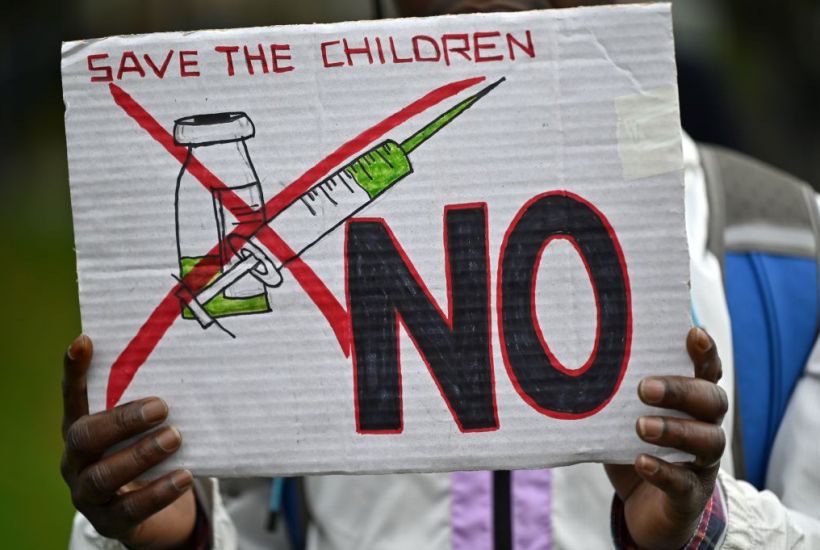Pfizer has come up trumps. Now that a vaccine for Covid-19 is more than just a possibility, we can breathe a collective sigh of relief. But before we relax too much, a new problem arises: will people actually take it?
A third of people in the UK – and half of people in the United States – say they are either uncertain or unlikely to agree to be vaccinated against coronavirus, according to research from the Royal Society and the British Academy. It’s easy to scorn anti-vaxxers. They are the tin-foil hat wearing idiots who set fire to 5G phone masts at the start of the ‘plandemic’. They are the ‘reckless, ‘shameful’ and irresponsible parents who are happy to put their children at risk if it means getting one over on Big Pharma or the Tech Giants. They are at best, gullible; at worst, dangerous.
I am not one of them. My eldest child, now 22, was born when panic over the MMR jab was all the rage. He was immunised on time, without a qualm, as were my other two children. I will line up for my Covid jab. Like so many other people, I am yearning for freedom and normality to resume.
But at the risk of being lumped in with the anti-vaxxers, I do have concerns. This time last year, no human had ever heard of Covid-19. Now we have a vaccine that has been developed in record time. Far more significantly, this new vaccine lands in a febrile environment where individual medical decisions have become highly politicised.
We live in a world where Saturday night television is interrupted by our Prime Minister and his chief scientific advisors presenting graphs showing 4,000 people could die every day from Covid-19 if a second lockdown is not imposed. Yet as we all now know, this data – only ever a worst-case scenario – was out of date even before it was displayed. This badly undermines trust in the government.
Boris Johnson and Matt Hancock defer to ‘the science’ in all matters. But everyone else now knows that scientists disagree. When Theresa May accused the government of choosing figures ‘to support the policy, rather than the policy being based on the figures,’ she echoed the suspicions of many.
We have been made suspicious and yet dissent is forbidden. At televised press conferences, correspondents only ever demand tougher restrictions. Research that supports lockdown or mask wearing is promoted before it has been peer reviewed, while studies that challenge the consensus struggle to get a platform at all. Social media platforms have gone into overdrive, removing content, issuing warnings about unverified material and banning lockdown blasphemers.
Now, in response to their polling, the Royal Society and the British Academy, are calling for the spreading of anti-vaxx conspiracy theories to be made a criminal offence. Their report recommends ‘legal consequences for individuals or groups that spread misinformation’. Not only would such a ban threaten free speech, it also reinforces suspicions that the government, scientists, Big Tech and Big Pharma have something to hide, whether or not this is the case.
We have all got used to mask-wearing and hand-sanitising. But it is worth remembering that when it comes to debate, it is sunlight that makes for the best disinfectant. We need more transparency, not less, in discussion about coronavirus.
Yet government ministers and SAGE members alike refuse to acknowledge uncertainty and doubt. Their assumption seems to be that the public cannot handle ambiguity. Instead, we are treated to infantile messages like ‘hands, face, space.’ Our role is simply to obey orders. We must stay at home, save lives and protect the NHS. At every turn, we have been refused permission to exercise individual judgement. Back in April, someone who decided that sitting on a park bench was best for their mental and physical health risked being moved on by the police. This month, a woman was arrested for removing her mother from a care home.
Since the start of the pandemic, the government has used dodgy data and presented a one-sided view of science. They have pretended there is certainty where there is none. This has created a climate of distrust and doubt. Much of the media, and all the major social media platforms, have sought to quell dissenting voices. This has only reinforced people’s suspicions.
When science itself is politicised, it is hardly surprising that people have concerns about a new coronavirus vaccine. In response, rather than presenting people with facts and allowing free debate, doubters are mocked and calls go out for bans and coercion. Tory MP Tom Tugendhat said he ‘can certainly see the day when businesses say: ‘Look, you’ve got to return to the office and if you’re not vaccinated you’re not coming in.’’
In highlighting potential vaccine-avoiders, the Royal Society and the British Academy conflate people with concerns and people who will refuse a jab. There is no reason to assume that those with concerns will avoid getting vaccinated. But to ensure they do, the government must work to rebuild trust in a population they have made suspicious. We need more honesty and less bludgeoning with dodgy statistics; we need more open debate and less censorship.
Got something to add? Join the discussion and comment below.
Get 10 issues for just $10
Subscribe to The Spectator Australia today for the next 10 magazine issues, plus full online access, for just $10.




















Comments
Don't miss out
Join the conversation with other Spectator Australia readers. Subscribe to leave a comment.
SUBSCRIBEAlready a subscriber? Log in